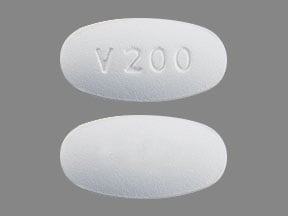
Vfend Coupons & Savings Card – Discount Prices from $66.97
Brand for: Voriconazole
My prescription
Edit
200MG, Voriconazole (60 Tablets)
Select pharmacy

CVS
$66.97
COUPON PRICE
Walgreens
$110.40
COUPON PRICE
Walmart
$133.92
COUPON PRICE
Albertsons
$135.41
COUPON PRICEVfend savings card
Show this card to your pharmacist
CVS
$66.97
BIN
ID
PCN
GRP
019876
LH2AC2B65C
CHIPPO
LHX
Powered by
Related azole antifungals prescriptions
More prescriptions for thrush
Related azole antifungals prescriptions
More prescriptions for thrush
Price history for Vfend (brand) & Voriconazole (generic)
60 Tablets, 200MG
Average retail price for Vfend
Average retail price for Voriconazole
Average SaveHealth price for Voriconazole
Our price history data is based on aggregated prescription data collected from participating pharmacies in America. Our prescription data updates daily to reflect the latest price changes. If you notice a missing data point, it means there wasn't sufficient data available to generate a monetary value for that date.
Over the last 12 months, the average discount price of Vfend is $96.62 using the SaveHealth savings card. That's an average savings of 91.44% on Vfend with our discount card.
*Retail prices are based on pharmacy claims data, and may not be accurate when we don't have enough claims.
Vfend (Voriconazole) dosage forms
Dosage Quantity Price from Per unit 50MG 1 Tablet $5.06 $5.06 50MG 30 Tablets $24.96 $0.83 50MG 60 Tablets $31.63 $0.53 200MG 60 Tablets $66.97 $1.12 200MG 1 Tablet $4.69 $4.69 200MG 20 Tablets $34.52 $1.73 200MG 30 Tablets $42.64 $1.42
| Dosage | Quantity | Price from | Per unit |
|---|---|---|---|
| 50MG | 1 Tablet | $5.06 | $5.06 |
| 50MG | 30 Tablets | $24.96 | $0.83 |
| 50MG | 60 Tablets | $31.63 | $0.53 |
| 200MG | 60 Tablets | $66.97 | $1.12 |
| 200MG | 1 Tablet | $4.69 | $4.69 |
| 200MG | 20 Tablets | $34.52 | $1.73 |
| 200MG | 30 Tablets | $42.64 | $1.42 |
What are the serious side effects of voriconazole?
Serious side effects of voriconazole may include liver problems, such as jaundice or elevated liver enzymes, vision changes, including blurred vision or sensitivity to light, and neurological issues like confusion or hallucinations. It can also cause serious skin reactions, heart rhythm changes, and kidney problems. If any of these occur, it is important to seek medical attention promptly.
What are the side effects of voriconazole on the brain?
Voriconazole can cause several neurological side effects. These may include visual disturbances, such as blurred vision or changes in color perception, as well as hallucinations. Patients might also experience confusion, dizziness, or headaches. In some cases, more severe effects like encephalopathy have been reported. It is important for patients to report any unusual neurological symptoms to their healthcare provider while taking voriconazole.
What is the difference between fluconazole and voriconazole?
Fluconazole and voriconazole are both antifungal medications, but they differ in their spectrum of activity and clinical use. Fluconazole is commonly used to treat yeast infections, such as those caused by Candida species, and is effective against certain types of fungal infections. Voriconazole, on the other hand, has a broader spectrum of activity and is often used to treat more severe fungal infections, including those caused by Aspergillus species. Additionally, voriconazole is known for having more potential drug interactions and side effects compared to fluconazole.
Why does voriconazole cause hallucinations?
Voriconazole can cause hallucinations due to its ability to cross the blood-brain barrier and affect the central nervous system. This antifungal medication can lead to neurotoxic effects, which may result in visual or auditory hallucinations as a side effect. The exact mechanism is not fully understood, but it is thought to be related to the drug's influence on neurotransmitter pathways in the brain.
What is the risk of voriconazole?
Voriconazole can have several risks and side effects. Common risks include visual disturbances, such as blurred vision or changes in color perception, and skin reactions, including photosensitivity and rash. It may also cause liver enzyme abnormalities, leading to potential liver damage. Less commonly, it can affect heart rhythm, leading to QT prolongation, and may cause neurological effects like hallucinations or confusion. It is important for patients to be monitored regularly by their healthcare provider while taking voriconazole to manage these risks effectively.
